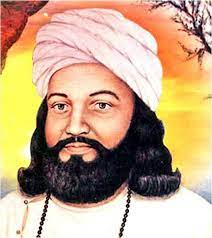
Article by
In the rich drapery of Punjabi literature, the name Waris Shah stands as a luminous thread, weaving together tales of love, sacrifice, and societal critique. Often hailed as the Shakespeare of Punjab, Waris Shah's literary prowess transcends time, echoing the sentiments of an era marked by cultural richness and societal challenges.
Born in the early 18th century in the village of Jandiala Sher Khan in present-day Pakistan, Waris Shah was nurtured in an environment steeped in Sufi traditions and the mystical teachings of the great Sufi saints. The Punjab region, with its diverse cultural influences and the confluence of Hindu and Muslim traditions, provided Waris Shah with a melting pot of inspiration.
Waris Shah's magnum opus, the epic poem Heer Ranjha, catapulted him to literary eminence. Drawing inspiration from traditional Punjabi folk stories, the epic weaves a tale of profound love, tragic separation, and societal upheaval. Yet, beyond the enchanting verses lies a poet who donned the mantle of a social critic, using his literary prowess to confront the prevalent social evils of his time.
In the tradition of great poets who transcend mere artistic expression to become the voice of their society, Waris Shah stands tall. He utilized the medium of poetry not just for aesthetic pleasure but as a powerful tool to raise his voice against the prevalent social injustices and malpractices.
One of the prominent themes in Waris Shah's work is the condemnation of the rigid caste system. He vehemently spoke against the discrimination and oppression faced by the lower castes, urging society to abandon these archaic practices. His verses resonate with a plea for equality, envisioning a society where merit, not birth, determines one's worth.
Waris Shah, akin to Shakespeare, had an acute understanding of the human condition. He delved into the complexities of societal norms and human relationships, using his verses to challenge prevailing customs. In Heer Ranjha, the character of Heer becomes a symbolic representation of societal resistance against oppressive traditions, echoing the struggles of individuals against the constraints imposed by society.
The poet also directed his lyrical gaze towards the treatment of women in society. In a time when the voices of women were often stifled, Waris Shah dared to advocate for their rights and recognition. Through the tragic tale of Heer, he shed light on the plight of women, urging society to reconsider its treatment of the fairer gender.
Waris Shah, like Shakespeare, achieved a remarkable synthesis of the cultural influences around him. In the complex social fabric of Punjab, he found inspiration not only from Sufi mysticism but also from the rich folk traditions of the region. His verses resonate with the vibrancy of Punjabi folklore, creating a literary masterpiece that captures the essence of the land and its people.
The legacy of Waris Shah endures through generations, echoing in the hearts and minds of those who appreciate the transformative power of poetry. His poetic expressions served as a catalyst for societal introspection, paving the way for conversations that challenged the status quo. The Shakespeare of Punjab not only left behind a literary masterpiece but also an indelible mark on the socio-cultural landscape of the region.
Waris Shah's impact stretches far beyond the borders of his time, resonating in the contemporary landscape. His verses, although penned centuries ago, continue to serve as a mirror reflecting the societal challenges of today. The Shakespearean ability to capture the essence of human nature is mirrored in Waris Shah's poetic narratives, offering timeless insights into the human experience.
In a world grappling with social inequality, Waris Shah's advocacy for a just and egalitarian society remains relevant. His verses on caste discrimination echo in the corridors of time, urging present generations to confront and dismantle oppressive systems. The poet's call for gender equality finds echoes in the ongoing global conversations around women's rights and empowerment.
Moreover, Waris Shah's skillful use of symbolism and allegory adds layers of complexity to his work, inviting readers to delve beyond the surface narrative. Much like Shakespeare's nuanced exploration of power dynamics and human flaws, Waris Shah's poetry unfolds as a multi-faceted commentary on societal intricacies.
The enduring resonance of Heer Ranjha lies in its ability to traverse temporal and cultural boundaries. Translations and adaptations have allowed Waris Shah's words to reach audiences far beyond the confines of the Punjabi-speaking world. His narrative on love, loss, and societal transformation finds universal appeal, making him a literary giant with a global footprint.
 Monthly "Azeem English Magazine", launched in 2000, records the information about diverse fields like mental health, literature, research, science, and art. The magazine's objective is to impart social, cultural, and literary values to society.
Monthly "Azeem English Magazine", launched in 2000, records the information about diverse fields like mental health, literature, research, science, and art. The magazine's objective is to impart social, cultural, and literary values to society.
+92 51 88 93 092
First Floor, RAS Arcade, Eidhi Market, Street#124, G-13/4, Islamabad, Pakistan, 44000.